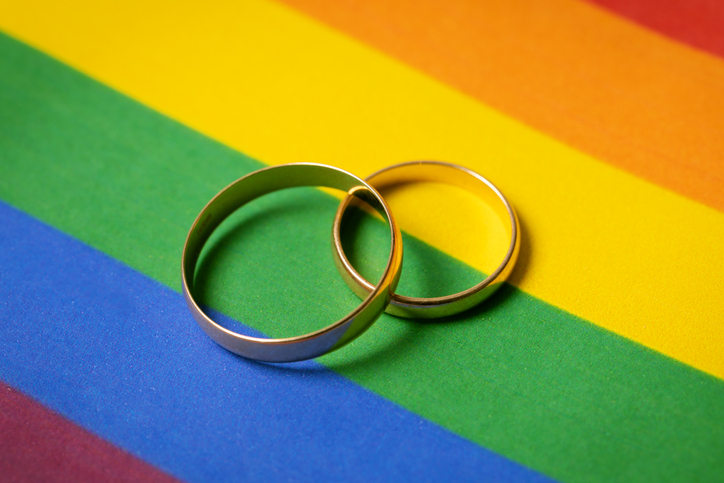June is traditionally the month for marriage, and it’s also the month for Pride and equality. It might not be a good time to talk about FGBTQ+ Divorce, but equality in marriage should mean equality in separation. All parties should have the same standing leaving the marriage as they did entering.
Recent court decisions have assisted the legal equality of dissolution of marriage; but the rest is up to the divorcing couple. If everyone works to have an amicable divorce, the laws can help you and your partner celebrate Pride Month if not as a couple then as equal members of your community.
Getting the Law on Your Side
As recently as 2015, divorce laws were still heavily gendered and exclusive. Laws referred to “husband and wife” when dividing property, and “mother and father” when establishing a parent-child relationship, meaning the couple had to argue over who used property in a “manly” way or acted in a “maternal” fashion towards their children.
Thanks to the Supreme Court rulings Obergefell v. Hodges, which guaranteed the right of marriage to all same-sex couples, and Pavan v. Smith (137 S.Ct. 2075 (2017) which extended Obergefell to the benefits of marriage, including parentage and child custody, legally couples don’t have to do this any longer.
An increasing number of states have eliminated gendered language in favor of “spouses” and “parents,” presuming that, surprisingly, both parties contribute equally to the business of marriage and child-rearing. When it comes to same-sex divorce, this creates a greater sense of equality during the proceedings.
Legal Considerations and Concerns
Of course, just because the law says something doesn’t mean everyone cooperates. There is still plenty of prejudice in the courtrooms, and contentious same-sex divorces are just as unpleasant as heterosexual divorces. Just because the law says the parents are equal under the law will not prevent an angry spouse from claiming her lesbian partner is distant, abusive, or cold towards the children—just like any husband.
On the flip side, the Pavan ruling means that, while same-sex partners are entitled to the same benefits and protections of marriage, it also means that partners cannot dodge their responsibilities following a divorce. State laws now accommodate assisted reproduction in same-sex marriages and require the biological mother’s spouse to pay child support despite the absence of biological relationship (Treto v. Treto, 622 S.W.3d 397 (Tex. App. 2020).
Obergefell has resolved many of the other issues facing same-sex couples, namely, when the marital relationship begins. Prior to the decision, same-sex couples might be legally married in half a dozen states, but their status would not be recognized in the remainder. This meant a divorce in one state might or might not be lawful in any of the 49 other states. Property division was equally unsettled.
Thanks to Obergefell, all same-sex marriages became legal nationwide as of 2015. As of 2024, nearly all states have abolished “domestic partnerships” for purposes of same-sex relationships. There are still hiccups in resolving property issues, where partners neglected to retitle real estate or other property, but far fewer than previously.
Amicable Resolutions for LGBTQ+ Divorce
With all this in mind, same-sex couples can enjoy the same amicable resolutions as their heterosexual counterparts with the assistance of comprehensive divorce mediation. In fact, thanks to the Supreme Court rulings, amicable divorce is easier for couples because couples don’t need to worry that an agreement in one state won’t be binding in another state.
With an amicable divorce, couples can craft a separation that accommodates everyone’s preferences and needs. Today, that includes a type of spouse Obergefell doesn’t cover: Transgender spouses. Sadly, although most spouses support their transitioning partners, courts have yet to catch up.
Some courts (and judges and attorneys) remain biased against transgender parents, who could find themselves on the losing end of custody and visitation agreements. A mediated agreement where both parties participate outside of the courtroom can lead to better results and avoid any unpleasant confrontations.
Just as important, a separation where both parties participate in the process ensures equality for everyone. That’s the purpose of Pride month, equality and participation for all.
Other Reasons to Celebrate
Juneteenth (June 19) celebrates the day in 1865 that enslaved people in the remote parts of Texas learned that the Civil War was over and they were free. On June 12, 1967, the landmark court decision Loving v. Virginia enshrined interracial marriage rights in law.
Although it may seem odd to celebrate marriages and the end of slavery and amicable divorce, they all have the same things in common: equality for all parties. Everyone should be equal to enter into marriage, and then to leave the marriage on equal terms if they choose. If everyone can do that, then the laws have succeeded.
Final Thoughts
A friend of mine in California entered a “domestic partnership” many years ago, when lesbian marriage was still not recognized. She and her partner had two children with a donor, and for a few years all was good. Then her partner left her and took the children. With no marriage, and no biological relationship, my friend had no legal standing with the children. She never saw them again.
At Divorce With Dignity, our Providers never want to see that happen again. Divorces may not be amicable, but children should not be arbitrarily separated from a parent through operation of law. Thanks to the new rulings, this would not happen today. It’s too late for my friend now, but it isn’t too late for you and your family. No matter what situation you find yourselves in, we will work with you to find a solution that works for everyone.
Our Providers include attorneys, mediators, therapists, and other professionals who want to help you and your family get through a complex divorce. We’re just a phone call away if you need answers to your dissolution questions.


